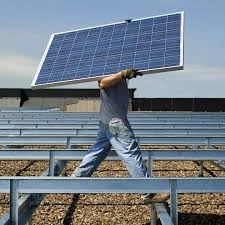solar panel efficiency heat
Understanding Solar Panel Efficiency and its Relationship with Heat
In the quest for sustainable energy solutions, solar panels have emerged as one of the most promising technologies. However, the efficiency of solar panels can be significantly influenced by their temperature, a factor that is often overlooked when discussing solar energy generation. This article delves into the concept of solar panel efficiency, the impact of heat on their functionality, and strategies to mitigate heat-related issues.
What is Solar Panel Efficiency?
Solar panel efficiency refers to the percentage of sunlight that is converted into usable electricity by a solar panel. The efficiency of solar panels has improved dramatically over the years, primarily due to advancements in technology and materials. Standard solar panels today boast efficiencies ranging from 15% to over 22%. The efficiency level is critical because it dictates how much energy can be generated from a given surface area. Higher efficiency means more power generated, which is essential for optimizing solar installations where space is limited.
The Temperature Factor
While solar panels are designed to harness sunlight, they are also susceptible to temperature changes. As the temperature of a solar panel rises, its efficiency tends to decrease. This phenomenon can be attributed to the physical properties of the semiconductors used in panels, mainly silicon. When the temperature increases, the energy levels of the electrons within the material become elevated, which can hinder their ability to generate electricity effectively.
Typically, solar panels perform optimally at cooler temperatures. Most solar panels experience a drop in efficiency when temperatures exceed 25°C (77°F). For every degree Celsius above this threshold, solar panel efficiency can decrease by approximately 0.5% to 0.8%. This reduction may not seem significant at first glance, but over a long period or through extensive arrays, it can lead to considerable losses in energy production.
Implications of Heat on Energy Production
The implications of heat on solar panel efficiency are profound, particularly in regions that experience high temperatures. In areas such as the southwestern United States, for instance, solar panels need to be more efficient to offset the energy lost due to high temperatures. This can translate to a lower return on investment for solar projects, making it crucial to understand how to manage heat effects.
solar panel efficiency heat

Cooling Techniques and Innovations
To mitigate the adverse effects of heat on solar panel efficiency, several cooling techniques and innovations have been explored
1. Passive Cooling Some designs incorporate passive cooling techniques, such as using reflective materials or designing mounting systems that allow air circulation under the panels. This helps in dissipating heat and maintaining a lower operating temperature.
2. Active Cooling Systems Active cooling solutions, which involve various methods such as water cooling or ventilating systems, are being developed to keep solar panels cooler. Although these systems can be costly and complex, they can improve efficiency, particularly in extreme heat conditions.
3. Bifacial Solar Panels These panels can capture sunlight on both sides, thus increasing the total energy capture. They are often more efficient even in high temperatures because they can utilize reflected light from the ground.
4. High-Temperature Tolerance Materials Innovations in material science have led to the development of solar cells that maintain better efficiency at higher temperatures. These advancements can significantly enhance the performance of solar panels in hot climates.
Conclusion
Understanding the relationship between solar panel efficiency and heat is vital for optimizing solar energy systems. As the demand for renewable energy grows, addressing the challenges posed by high temperatures will be crucial. By leveraging cooling techniques and investing in innovative technologies, we can enhance solar panel efficiency, ensuring that they remain a viable energy solution across varying climates. As research and technology progress, the potential of solar energy will continue to illuminate our path towards a sustainable future.
-
Unlocking Energy Freedom with the Off Grid Solar InverterNewsJun.06,2025
-
Unlock More Solar Power with a High-Efficiency Bifacial Solar PanelNewsJun.06,2025
-
Power Your Future with High-Efficiency Monocrystalline Solar PanelsNewsJun.06,2025
-
Next-Gen Solar Power Starts with Micro Solar InvertersNewsJun.06,2025
-
Harnessing Peak Efficiency with the On Grid Solar InverterNewsJun.06,2025
-
Discover Unmatched Efficiency with the Latest String Solar InverterNewsJun.06,2025







